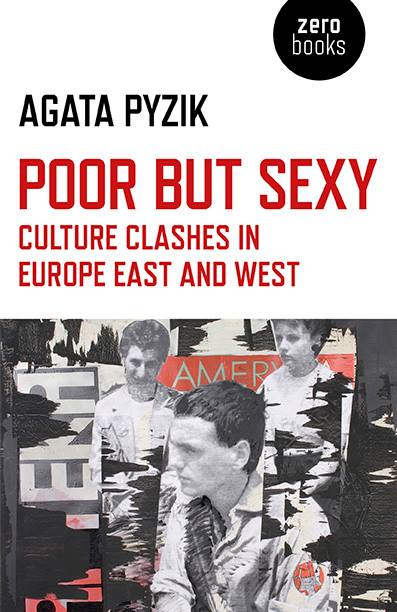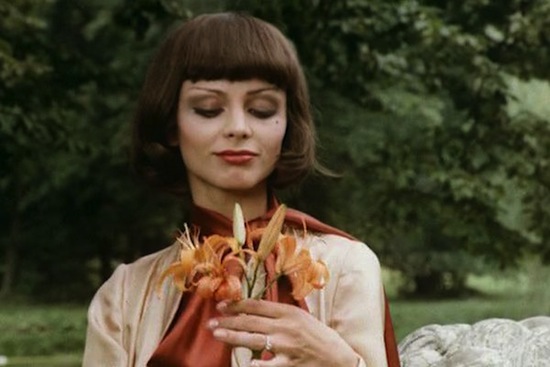The late 1970s marked the end of the Polish era of relative prosperity. When the bill for Poland’s attempt to borrow its way into consumerist abundance was called in, it was a moment when all the dreams of socialist efficiency, which pervaded the popular imagery of the previous decades, must have had reached their end. There was no possibility of pretending anymore, the consumerism we briefly enjoyed was a sham. The affluent 70s started to reveal itself as a delusion of wealth: achieved through massive loans which threw Poland into a dangerous debt. A decade which started with the tragic repression of strikers on the Baltic coast ended in the massive economic crisis that started to reach every level of society. Aptly, the Gdansk shipyard strikes were prompted by the fact that meat prices were too high. Then Martial Law came in December ’81 – the coup led by General Jaruzelski and his army junta against its citizens. Curfews meant people often had to stay together at each other’s houses.
One of the best Polish post-punk bands of that era, Kontrola W, were originally named Kontrola Władzy (Control of Power), but – probably because the group didn’t want to land themselves in trouble – they decided to shorten it. At some gigs, when they were announced, someone from the crowd would say: "But you can’t control power!" "But it’s about us being controlled by power," the band allegedly replied. They would later claim that the W stood for Wrażenia (Impressions). Still, the lyrics remained militant and pugnacious, with the music merging retro rockabilly elegance and post-punk erudition, bringing to mind Burroughsian topics of control from the state, communist newspeak, atomic war, nuclear crisis, hiding in bunkers, imagining the end of the world, fear of pollution and radioactivity, state controlled media brainwashing society, erasure of the self by the mass culture, personality crisis. Sounds familiar? These were the typical disillusioned subjects of punk and post-punk, but they had an extra resonance here. For instance, they ridiculed and questioned the efficiency of Poland’s collapsing post-81 economy. Like outré new wave/post-punk outfits Xex or Devo earlier, they reacted with its absurdisation: Your factory leads in the world / they make everything the best in the world / radioactive! / Radioactive little balloons / Radioactive ties / Radioactive lipsticks / Radioactive dummies! Then the song comes back to the bleak reality of work: Your leading factory / you work there four shifts a day / and have no time /for romances / no time / to be intellectual! The factory existence influences the whole worker’s body and physiology: Radioactive are your eyes / your hands / your heart / your brain!
On the top of that Kontrola dressed like something between Russian Futurists and post-war Polish communist scouts. But we must remember what was actually happening in Poland around the time the band came in to existence. It was only shortly after they got together that Martial Law was proclaimed, which in its first phase was like a real war for many people: tanks, food crises and rationing, curfews, people arrested, ‘accidental’ deaths on the streets. Terror. Under this atmosphere Kontrola W took part in youth festivals from 1982, and in 1983, only when the repression began to be relaxed. Leader Darek Kulda says in an interview from 1984: “I wanted to make an ugly music. It was a period when on Polish radio there was nothing apart from hard rock, which I was sick of. I decided to create a band whose music would be unclassifiable, neither rock, nor jazz, nor nothing. We failed, ‘cos they put us under a label: new wave.” Listening to the six salvaged Kontrola W tracks that have survived, despite their poor recording quality, they possess an instantly recognizable originality: a precise and smooth-as-hell rhythm section (drummer Wojtek Jagielski, who in ‘free’ Poland became a talk-show celebrity) drives the motorik of ‘Bossa Nova’, which starts with a few seconds of scratching, compulsive guitar strings. An out-of-tune, sick, broken rock and roll, the song progresses in angular groans and whines of guitar, accompanied with the self-possessed, very capricious screech of Kasia Kulda, in which she’s trying to get rid of an importunate lover:
When there’s nothing to talk about / you persecute me at every step/ Crawling upon my feet (…) / and if this doesn’t bring effect / you can only sing this old tune: Bossa Nova!
Kulda sings with a sharpness and panache that Siouxie Sioux would be jealous of, if she had only known about it. In the complicated ways of the development of popular music in the Soviet Bloc it’s easy to classify bands immediately as some sorts of poor, oppressed oppositionists. On both sides of the Curtain the youth felt that the current political order was wrong, that there were no opportunities for people like them. The music that arose everywhere in the punk era, regardless of whether it was Eastern or Western, was directed by a similar impulse of disillusionment, of taking things in one’s hands, an ability to express anger and dissatisfaction. On both sides it was a manifestation of the dispossessed: the fact that the Western youth were rejecting the comfortable lifestyle of Baby Boomers, and the fact Poles had nothing to lose doesn’t change this.
This strange time between the fake promise of bling and the grey, concrete reality resulted in a sudden change in more mainstream Polish pop, which embraced and flirted with the fallen dreams of beautiful commodities that hadn’t exactly turned into reality. The historical, economic and cultural moment was perfect for this: the old cynicism of the Party was replaced by the enthusiasm of Solidarity, and the old truths didn’t matter anymore. Be it the scarcity of the official culture or the hunger for emancipation, Polish popular music in the break between the 1970s and 1980s spawned more interesting female vocalists and music personalities than ever before or after. Izabela Trojanowska was a one-woman Polish New Wave movement, whose populist songs picked up where punk left off. Drawing on the empowered feminine-but-tough girls of post-punk and pop-punk – the rapaciousness of Siouxie Sioux, the girlie charm of Debbie Harry or the boyishness of Chrissie Hynde – she added a completely new air of a mature sexy femininity.
In Poland, she represented a completely new kind of female pop performer with a quite shocking demeanour of self-confidence, sex and modernity. She wore short, predatory hair, strong makeup with compulsory blood-red lipstick, and an aptly-garconne wardrobe. Androgynous suits with a feminine, perverse twist, sequin blouses in dazzling whites and zero degree of sentimentality. Walking on her red stilettos with exaggerated puff shoulders, Trojanowska was rather like a communist David Bowie/Klaus Nomi, a Thin White Duke and a Bauhausian doll, harsher than any male performer ever in the Soviet Bloc – maybe, because she understood and played well with androgyny. In several photos she assumes a pose similar to Bowie, and in one TV programme even performed dressed as a Bowie-esque New Romantic Pierrot, with glitter-brocade makeup on her face. Iza wore both male and female clothes, always with a dominating air: jackets with spiky, ‘neo-gothic’ collars and shoulders in striking, saturated colours, red and amaranth leather dresses and jackets; metallic, futuristic coats, like an elegant cyborg, akin to Sean Young in Blade Runner, and huge, Futurist sunglasses. The whole of her person seemed to exude the metallic sheen of a sexy robot.
In this she was also predestined by the self-irony with which she smilingly-rejected any possible feminine clichés of life in the Bloc. She was a Helmut Newton-esque ‘scary businesswoman’, who didn’t have anywhere to go to work, so in her videos she posed by the only ‘modern’-looking shiny skyscrapers she could find in Warsaw. She used men like toys whenever she fancied, but mostly she was self-sufficient, with strong lesbienne undertones a-la-Dietrich, or flirting with a glam vampirella look. A sharp gal who couldn’t stand the failure of a boyfriend to give her all she wanted, now. (No wonder that one of the first drag queen shows in early 90s Poland was an Iza T. impersonation.) Imagine the shock which this caused any typical Polish man, used to a housewife who’d hand him a hot meal and slippers in their much–awaited two-bedroom flat. In her lyrics, she was shockingly sarcastic towards socialist efficiency, mocking both Socialist Realist Stakhanovites, and the prosaic reality of endless material lacks which was everything but glamorous. The heroic times of socialism were clearly gone, as Iza T. commented with a bored, sarcastic voice:
No more Heroes… and even if, where to take them from?:
So much wealth has gone to waste
Laurel wreaths and golden ribbons
Nearly ready plinths
On which already someone climbed before.
One misty morning the Endless Olympics flown away
There’s no more demand for heroes
And even if, where to take them from?
The jolly dancing speaker’s voice
Doesn’t solve problems anymore
Paper in hand, bored, they queue
With Bolek & Lolek – what a waste
And it is harder every day
For girls to fall in love in vain.
No more heroes anymore…
By then nobody believed in the system anymore, but here punk-nihilism was taken up by commercial pop. As Iza rejected the idea of shacking-up with a boy and waiting 10 years for a council flat, she mocked the scarcity of means, most famously in ‘The Song of the Brick’ – in which the chorus line ‘pass me a brick’ is a reference to a 1950s Stalinist slogan of building Communist Poland. There she was in 1980, recalling the times everybody wanted to forget: just like Wajda, bringing back the trauma of Socialist Realism. During a memorable televised performance at the Opole festival in 1980, dressed in the exaggerated red cravat of a communist youth organisation member, surrounded by naked musclemen painted gold (!) she parodied the positivist, brightly
coloured sotsrealist boom of growth and prosperity:
Pass the brick, pass the brick
Let’s build a new house!
Up to our aspirations – a house!
Rain will stop, sun will rise
A new harvest will grow
Through our hearts and our hands!
Our cause is simple, our goal is clear!
You can hear our jolly song everywhere
In a short moment we’ll even touch the stars!
Don’t stay behind, if you don’t want to be left alone!
Spring will come, and immediately
Hundreds of Steelworks will grow
There will be plenty of everything!
There’s no paths or ways we couldn’t reach!
We know who’s our friend or foe!
Soon we’ll embrace the whole world in our arms
And who’s not with us, is against us!
All this she sung with a flirtatious kind of flippancy. Her character was too disillusioned, too cynical to believe either the authorities or the promises of men. She looks with pity at the boy, who talks about the bright future:
You tell me ‘just a bit effort and the world belongs to us’.
Well, lets say – in eight years?
A tower block flat and a small Fiat
Don’t even think you’re gonna afford it
Cos you can give me all I need now anyway!
Iza paved the way for several sharp female performers who appeared soon after. A French migrant, Richard Boulez, known in Poland for wearing colourful clothes, became the chief stylist of Kora, the charismatic singer of Maanam. Boulez and Kora were like the Halston and Jerry Hall or Grace Jones and Jean Paul Goude of Polish new wave: the stylist-artiste and the it-girl who has it all. Kora wore Bowie-esque kimonos and excessive, heavy jewellery, on synthetic bright-coloured, vampish sets specially designed by Boulez. Shocking the public at the Opole ’80 festival in dayglo-coloured clothes singing ‘Divine Buenos Aires’, Kora was all desire: to travel, to meet people, to shag men, to explore, to have everything she wanted.
Another ‘hot chick’ was Urszula, a big glossy-synth-pop diva, whose productions were close to Trevor Horn’s ZTT or Art of Noise. Her composers dwelled on the earlier synthesized disco of Giorgio Moroder, but gave it the sassiness of Blondie and the sublimity of ‘Blue Monday’. In Urszula’s songs the most mundane neighboured the most fanciful. She also fantasised about luxurious commodities, as in the ultra-synthy ‘The Seasonal Fashion Frenzy’, where her character can’t stop thinking about buying new, glittery clothes. One could ask, where in the grey 80s could she find any? In her songs there appeared surrealist flights of fancy – or tales of journeys to Outer Space – which also appeared in Polish post-punk and new wave music, as in Kapitan Nemo’s heavily synthed Electronic Civilisation. Kapitan Nemo aka Bogdan Gajkowski, self-styled minimal-wave futurist in a quirky bohemian black beret, was the great uncle of all today’s 80s revivalists. In his Wideonarkomania he pioneered a still-fresh in PRL topic of addiction to television and the suddenly available world of VHS, with a pulsatingly-colorful video, where sexual lust gets confused with Cronenbergian Videodrome fantasies. He sounds as if he already knew that 30 years later the generation of lo-fi ‘hypnanogics’ and Hauntologists will put the washed-out distorted VHS image retro aesthetic onto the pedestal of a hipster absolute.
‘This is a new hash for the masses /
White screen is shaking One move and you already live in it!
And after Bruce Lee
a bit of sex before you fall asleep.’
Delicate female backing vocals, heavy synths and an interest in the harshest modernity put him close to a Polish Phil Oakey, with touches of Gary Numan. There are also common references to sotsrealism: in Factory Love, love is of course ‘tough as steel’ and ‘according to the safety rules’.
Unfortunately, in reality, we couldn’t be driving further away from space and the computer world, as Soviet technology had its most modern, forward-thinking years already behind it. Paradoxically, when we caught up with the dominating futurist fashion within pop-culture, time-traveling and computer technology, as in the children’s trilogy of Pan Kleks (Mr Blot), an outrageously colourful, almost ‘queer’ character with incessant fantasy and penchant for futurism – a Polish cousin of Doctor Who – we had lost any potential to ever overtake the West with our ideas. Post-81 the socialist utopia started to growingly morph into dystopia.
The catastrophic SF of Piotr Szulkin, one of the most distinctive 80s Polish visionaries, disclosed a quite different realisation of the futuristic dreams, filled with fear first at the communist, and then capitalist, versions of totalitarianism. It’s an Orwellian vision immersed in philosophical, existential deliberations over the media, cynicism and the mental destruction of the individual. According to Szulkin’s films, the Soviet Bloc will be destroyed by Communism, after which Capitalism will take over, and turn out to be equally destructive. In a very loose adaptation of Wells’s War of the Worlds (1981), one country, which due to English names could seem Western, is invaded by Martians, who are a ‘higher’ civilisation – one which ruthlessly oppresses the lower one on Earth, as the Martians are bloodthirsty, horrific creatures, who vampirically live off humans. The world becomes overpowered by cynical media exploitation, and a brutal state apparatus assumes absolute control.
Even if the intention was for Martians to stand in for the Soviet Union (who were supposedly on the verge of invading Poland in 1981, which was then ‘prevented’ by the introduction of Martial Law by General Jaruzelski’s junta), in fact they rather resemble the other Cold War Empire – The United States of America. Their omnivorous media, popular culture and capitalist greed seem to be something that bothers Szulkin even more than the Soviet reality, as in Ga Ga – Glory to the Heroes (1985), where in post-communist, twenty-first century Americanised reality, humanity has conquered other planets. But on the colonised new worlds, mankind installs prostitution, vice and omnipresent media rule. In the finale, the hero is to be executed at a gigantic stadium media event broadcast across the entire solar system. We live in the world after the apocalypse, that’s obvious: in 1984’s O-Bi, O-Ba, End of Civilisation, after the nuclear war the whole humanity is reduced to living underground, like worms (several years before, and in a much more convincing way, than it was done by Emir Kusturica in Underground) and in these humiliating conditions they wait for the mythical Ark to take them away, the Second Coming, not knowing it’s only the criminal state apparatus’s propaganda. Instead of the Ark coming, the copula over the pitiful hole humankind lives in is collapsing. Still, the light revealed by the cracks is taken by the humans as the arrival of the Ark. Space in Szulkin’s films is nearly always one or another form of prison: people vegetate in claustrophobic, dirty hovels, waiting for miracles that never come.
At the time Szulkin was developing his visions, People’s Poland was in some of its darkest periods. We had rather more mundane problems, with austerity after the Martial Law and a collapsing economy. The topic of scarcity, strangely enough, must have become domesticated in the pop landscape of Late ommunism, because it kept coming back obsessively in pop music. Too down to earth to seriously debate about flying to space, Izabela stuck to disillusionment.






